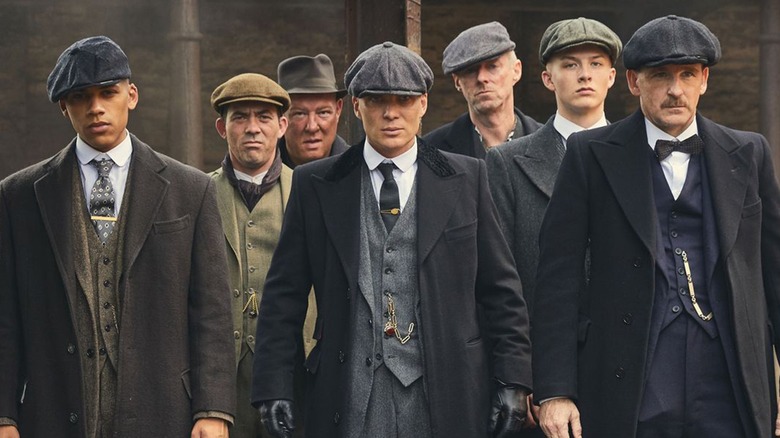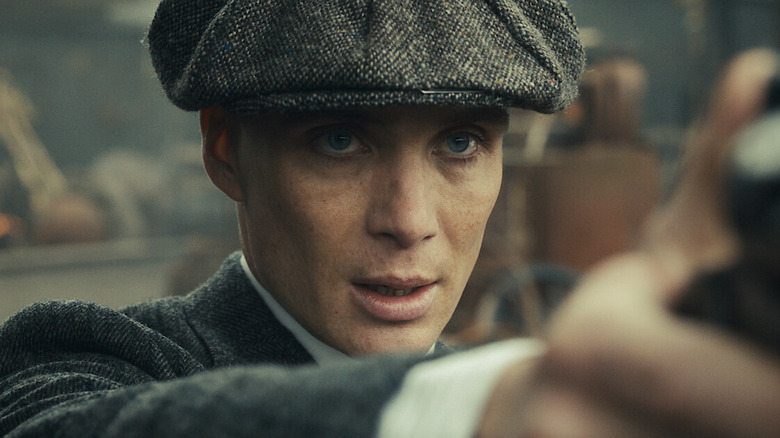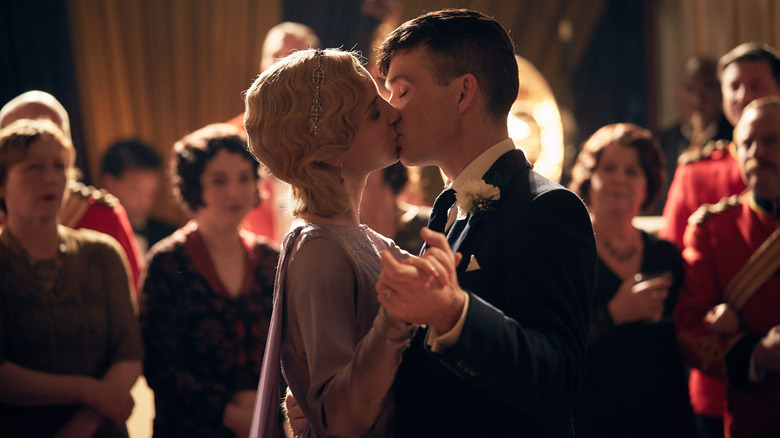Peaky Blinders' First Episode Had To Set Up As Many Plotlines As Possible
The first episode of any new show can be one of the absolute hardest for writers to craft. In addition to drawing in a brand-new audience and keeping them hooked for the rest of the season (and ideally beyond), there's no shortage of heavy-lifting to be done to ground the series on a strong foundation. It must establish a compelling main protagonist, their relationship with the supporting cast, and the overarching story as a whole in a way that never feels overstuffed or too expositional. In terms of gold standards over the years, one needs only to study the likes of "Breaking Bad," the two-part "Lost" premiere, "The Americans," and more to understand how crucial it is to waste no time at all in getting off to a fast start.
When "Peaky Blinders" first aired almost a decade ago, few could've anticipated just how popular this Birmingham-set, gangster-focused period piece would ultimately become. On the strengths of a profoundly-damaged lead character that nobody could take their eyes off of in Cillian Murphy's Tommy Shelby, a deep roster of fascinatingly flawed supporting players and intriguing plotlines, and an instant "hook" — a small-time crime boss in post-WWI England stops at nothing to lead his gang to greater and more ambitious heights — that did wonders to draw in viewers who may have been put-off by the admittedly strange title, "Peaky Blinders" managed to justify six total seasons (and an upcoming spin-off film) in order to tell its story from beginning to end.
But none of this success may have even come to pass in the first place if it weren't for a premiere episode that laid the groundwork for everything that followed. According to one key producer, the trick was to approach the very first episode with future seasons in mind.
Character, not plot
Throughout "Peaky Blinders," every vanquished rival, demoralizing setback, and obsessive grasp for more power has led to the Shelby Company Limited organization looking much different by the end of the series than it did at the start. With so many unpredictable twists and turns, however, it might be surprising to hear just how many were set up right from the first episode.
On the show's official website, executive producer Caryn Mandabach revealed her insights on making a premiere episode that gave viewers all sorts of story threads to follow. With that said, such a mentality doesn't necessarily mean overloading viewers with the minutiae of plot — rather, it's important to keep the focus squarely on character:
"In the U.S., when you do the first episode of a show, inside that first episode there are structures that allow the show to grow and last for a long time. Having done a number of very successful returning series, my assumption when launching an idea is that we're going to get series two, series three, and series four. The audience wants to know character, it doesn't really want to know plot. So our goal with 'Peaky Blinders' was to impact as many strands as possible inside that first episode for the viewer to follow."
According to Mandabach, this edict came straight from creator Steven Knight, who explained, "I want to do a show about a damaged guy who can't love and who can't feel when we first meet him. And I want to follow his journey through the satellites of the characters around him, who are principally his family. Because everyone has a family, everyone has a love interest, and everyone has a business. So he's going to meet people, firstly through his heart being moved by somebody."
'We knew it was a long-running series to begin with'
All storytelling, regardless of genre or medium or budget, needs to accomplish one major feat in order to connect with audiences: make it relatable. Everyday viewers aren't likely to draw many comparisons between themselves and someone as driven, ruthless, and damaged as Tommy Shelby. But what about the relationships he forges throughout the series? Producer Caryn Mandabach went on to describe how meeting a character like Annabelle Wallis' Grace or butting heads with the late Helen McCrory's Polly Gray helped make "Peaky Blinders" something audiences would want to return to, again and again:
"Those were the structures that people watching could follow. When Tommy arrives in series one and meets Grace, eventually falling for her, you're hooked. You think, 'Hey, that's happened to me! I've felt a bit lonely and miserable and then someone's melted my heart. Oh, I get it ...' So no matter who you are, you're connecting with the show in that regard. Or you might connect with the familial aspect: 'Hey, I might not have an Aunt Polly, but I have an important family member in my life.' Or, 'I might not have those brothers, but I have brothers. I may not have that sister, but I have sisters.' The show built a very relatable construct."
If this approach makes you think of the analogy of planting narrative seeds early on that would eventually bloom into full-blown arcs, Mandabach is right there with you. "We knew because of Steven's language that the first episode would be impacted with all the acorns needed for the show to be full of mighty oaks. We knew it was a long-running series to begin with."
Almost 10 years after its humble beginnings, the success of "Peaky Blinders" speaks for itself.


